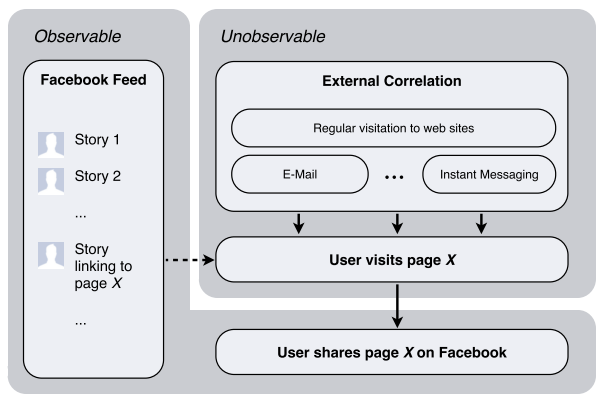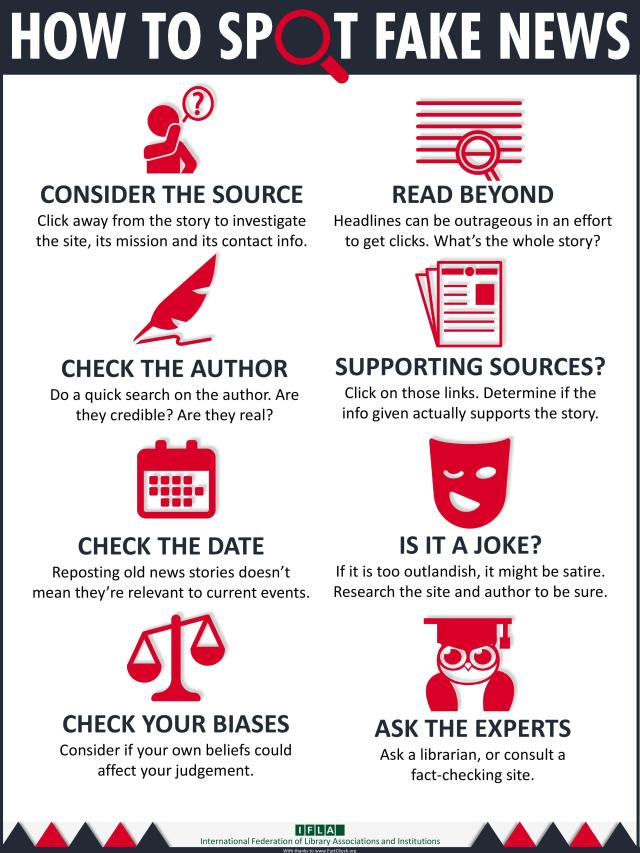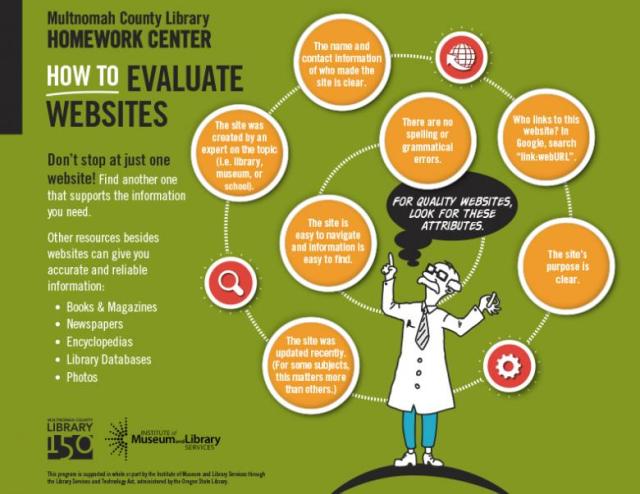How to best evaluate internet information?
It’s a big deal and an important skill to possess!
Not surprisingly, many people suffered from ‘filter bubble’ – a state of intellectual isolation beyond their realisation. It can lead to a snowballing confirmation bias that builds up steadily over time.

Source: Nieman Lab
How does filter bubble affects individuals?
Ways to overcome filter bubbles. Check it out!
Fake news is any article or video containing untrue information disguised as a credible news source, it has recently become a big problem in today’s digital world.

Source: IFLA
What does “Quality Information” even mean?
To me, the word quality involves some sort of judgement call; you’re comparing the object in front of you to some other object or group of objects you’ve experienced in the past. When thinking about a quality shirt, a quality TV show, or a quality YouTube clip, we think in terms of good and bad — not necessarily if it’s fact or opinion. So, this immediately makes me think about ‘distinct judgement amongst people’.
‘Quality Information’? (Dictionary Explanations)
In an evaluative sense, Merriam-Webster’s defines quality in the way I assumed above: “how good or bad something is.” However, their second definition adds nuance to the term, making it a bit more complex: “high level of value/excellence.” Oxford’s definition gives even more leeway to the person evaluating, saying that quality is “The standard of something as measured against other things of a similar kind or a degree of excellence in something.” Thus, using quality to describe digital resources, means something that is good and has high value.
However, everyone perceives value and “goodness” differently. The “one person’s junk is another’s treasure” saying rings true here.
After evaluating many strategies, generally it fits into these two categories:
- Relevance – assessment of whether something is valuable or good for the purpose.
- Validity – to evaluate whether/not information is correct/reliable

Source: Kathy Schrock
Furthermore, I try to rapidly ask myself if;
- A resource is valuable to me for what I’m doing (relevance)
- Whether or not it is right (valid&correct).
Asking these two questions capture the gist of other criteria(s) commonly used to assess information.
356 Words
References:
- Stray, J. (2012). Are we stuck in filter bubbles? Here are five potential paths out. Nieman Lab. Retrieved 15 November 2017, from http://www.niemanlab.org/2012/07/are-we-stuck-in-filter-bubbles-here-are-five-potential-paths-out/
- The Now: What is Fake News? – Full Page. (2017). GCFLearnFree.org. Retrieved 15 November 2017, from https://www.gcflearnfree.org/thenow/what-is-fake-news/1/
- How to evaluate website content. (2017). The University of Edinburgh. Retrieved 15 November 2017, from https://www.ed.ac.uk/information-services/library-museum-gallery/finding-resources/library-databases/databases-overview/evaluating-websites
Hello Christine, Insightful post you have there! I enjoy reading and it is easy to understand with the summarized points of how you summarized “filter bubble” as many people suffered from it and also can lead to a snowballing confirmation that builds up steadily over time.
In this case, I do always receive a false news for example, I believe you also received this unreliable news about “Solar Eclipse” which is NASA warning to ‘turn phones off because of cosmic rays’ sparks panic. As you know, this news has spread in which MILLIONS of people have received a warning that cosmic rays from the solar eclipse will damage their phones and electronics. However, I believe most people know how to spot the fake news as some recipients of the message were quick to see that the warning was a hoax. Generally, I believe into your quality information of two categories (Relevance and Validity).
(153 Words)
Reference:
Rawle, T. (2017, August 21). Solar eclipse: NASA warning to ‘turn phones off because of cosmic rays’ sparks panic. Retrieved from Dailystar: https://www.dailystar.co.uk/news/latest-news/639081/Solar-eclipse-NASA-warning-sun-moon-space-watch-live-when-where/
LikeLiked by 1 person
Hi Simon! Thanks for commenting! After reading the reference you gave me, it surely has given me greater insights about the effect(?) of fake news that are circulating worldwide, and how severe the results may be. Looking forward to receiving more comments from you in my future posts!
Cheers,
Christine Halim
LikeLike
Hi Christine!Nice and neat content which is really to read through! Like it!
It is interesting that you categorized into two factors for evaluating the news!
It is true that information that is authentic should possess reliability and validity which is very difficult to achieve both at the same times. As sometimes, one is achieved but another don’t. Therefore, an effective assessment of the information from your sharing is vital, well educate of evaluation Christ!
Looking forward to your posts!
LikeLike
Hi Rebecca! Thanks for commenting! Completely agree with your whole statement. Hope to see more of your comments in my upcoming posts!
Cheers,
Christine Halim
LikeLiked by 1 person
Hi Christine!
You have made a very interesting post ! It is true that many people suffered from “filter bubble” which result from personal searches the web algorithm guess selective the information the user may want to see based on the user ‘s search history, location, past click- behaviour, etc. In addition, Filter bubbles can cause cognitive biases and amplifying their negative impact on our critical and logistical thinking. For example, the effect of filter bubble on the US election in 2016 (https://www.wired.com/2016/11/filter-bubble-destroying-democracy/)
What do you think about the effect of filter bubble in our critical thinking?
You have mentioned a really good point of quality of information are of good quality or of high value. to determining the quality of the information in the web you should find out about the authority, currency, relevance, accuracy and the purpose of its post (https://www.library.georgetown.edu/tutorials/research-guides/evaluating-internet-content ).
LikeLike
Hi Thanh!
Thankyou for commenting! I assume that by now you may have known well enough about filter bubbles. Thus, I will straightforwardly answer your question of ‘the effects of filter bubble in our critical thinking’
So, even when a site is not offering specifically targeted content, we all tend to follow people whose views align with ours. To explain, when those people share a piece of content, we can be sure it will be something we are also interested in.
That might not sound so bad, but filter bubbles create echo chambers. We assume that everyone thinks like us, and we forget that other perspectives exist.
You may wish to check more about echo chambers from these websites:
https://www.washingtonpost.com/news/in-theory/wp/2016/07/14/confirmed-echo-chambers-exist-on-social-media-but-what-can-we-do-about-them/?utm_term=.38831b141157
https://en.wikipedia.org/wiki/Echo_chamber_(media)
One of the great problems with filters is our human tendency to think that what we see is all there is, without realizing that what we see is being filtered.
With that, I pretty much have answered your question!
Cheers,
Christine Halim
LikeLike
Hi Christine! Thank you for an informative post, it’s definitely enjoyable reading it! 🙂
I definitely agree with you that fake news has led to a big problem in today’s digital world. However, sadly, there are still people being unaware of this situation and the impact it can bring about.
I like how you have summarise the strategies into 2 simple categories namely relevance and validity on evaluating fake news. I believe we do have the responsibility to protect ourselves from all this fake news.
In addition, more laws will be introduced to tackle fake news in the coming year, with 91% Singaporeans supporting it. (1) However, there are concerns about discouraging mainstream and citizen journalism, people being wrongly accused & how will accuser with false claim handled? (2) With these concerns, do you think Singapore Government should still proceed for these new laws?
Looking forward to your reply! 🙂
(150 words)
(1) http://www.todayonline.com/singapore/new-laws-tackle-fake-news-be-introduced-next-year-shanmugam
(2) http://www.straitstimes.com/forum/letters-in-print/no-need-for-new-laws-to-tackle-fake-news
LikeLike
Hi Shilin! Thanks for commenting! I’ve read the references that you gave on Singapore planning to introduce new laws to tackle fake news. Based on what I think, maybe refining current laws may be a better solution(?)
According to professor Eugene Tan, even “governments themselves, for a variety of reasons … generate fake news”.
Retrieve this from
http://www.straitstimes.com/singapore/shanmugam-sets-out-strategies-in-battle-against-fake-news
This may be compounded by the fact that those in positions of power command a louder voice than the average citizen.
A case in point is American President Donald Trump, who declared allegations of his Russian connections to be fake and threatened the media. As it turns out, the case is now under investigation, but it demonstrates that those in power have the resources and the attention of the media to silence their critics through a declaration of “fake news”.
You may wish to check it out from:
http://uproxx.com/news/russia-trump-timeline/
Regulations that seek to eradicate fake news might have the opposite effect. The common man seeking justice may not use such laws for fear of high legal costs, while the rich may think nothing of bending them to their purpose.The powerful wield great influence and thus have the ability to silence and deceive. Any law must seek primarily to protect the weak, not lend a hand to those who seek to abuse it, no matter how remote the possibility.
If anything, we can learn from the Trump case that the arbiter to dispel fake news is an empowered media that probes relentlessly or keeps an issue front and centre. This would cultivate a more informed audience and require accountability from those who seek to perpetrate falsehoods.
Journalists who are familiar with a beat or the whims of a newsmaker would sniff out fabrications. These journalists must be cultivated by the industry and strengthened by laws that encourage good investigative journalism standards.
Thus to address your question, maybe a better media, and not rigid, punitive laws, is the best counter to fake news, regardless of the source. Hopefully that may answer your questions!
Cheers,
Christine Halim
LikeLiked by 1 person